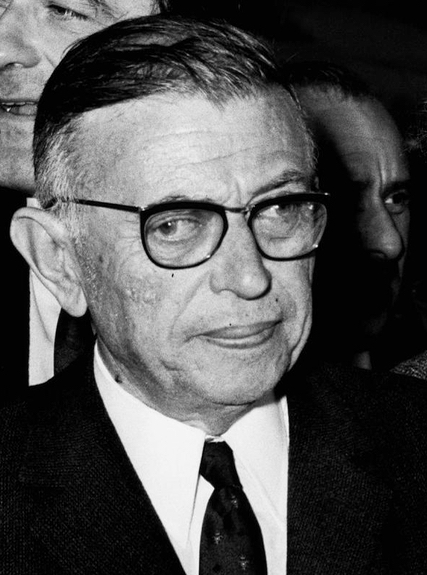Sartre’s plays of the 1950s were appreciably longer than those of the 1940s. Indeed, all four of the later ones are 1.5 times as long as the longest of the earlier one (The Flies).

“Le diable et le bon dieu” (The Devil and the Good Lord, 1951) recalls for me Brecht’s play about the 30 Year Ward, “Mother Courage,” though its title character (singular) is male. The warlord Goetz, who has betrayed his brother and is prepared to raze Worms, is persuaded to spare it and seeks to build a utopian community instead of wage war heavy on rape and pillage.
Edmund White has claimed that this was Sartre’s favorite of his plays. I have (albeit long ago) read Sartre’s Saint Genet (1952) and don’t really see Goetz being based on the petty thief Jean Genet, even as exalted (canonize) by Sartre. For me, Goetz is not an especially interesting character, although I can sympathize with his frustratios at not being able to “go straight” (that is build a community of peace rather than lead troops into battle). His antagonists (the would-be people’s priest Heinrich and the proto-communist Nasti) are even more types, not characters, as are the woman devoted to him after he raped her (Catherine) and a would-be Mother Teresa (more Mother Bountiful), Hilda.
At the end, Goetz is resigned to doing what he must: “I have no other way of being among men. There is a war to fight, and I will fight it.” (The conclusion is the same of Arjuna in the Bahagavad Gita, but Arjuna’s duty to fight was explained to him by the god Krishna).
+
“Kean” (1953) is like nothing in Sartre’s extensive oeuvre—a romantic comedy with a Wildean (Ideal Husband) feel. An adaptation of a play by Alexandre Dumas père about the love life of the fabled English actor Edmund Kean’s amours, notably one with Elena, Countess de Koefeld, the wife of the Danish ambassador. Kean is something of the tastemaker (at least for female flesh) of the dissolute Prince of Wales (modeled on the future Edward VII, who was 60 when he took the throne; the real prince/king was born after Kean’s death). If there is any philosophical subtext of this heavy-footed comedy, I missed it. (Goetz definitely had existential crises!)
+
“Nekrassov” (1955) is a more original comedy that also runs on too long. Its concern with role-playing and role-engulfment brings to mind the plays of Luigi Pirandello. The play has a Cold War setting. Nekrassov is a high Soviet official who has disappeared. In the West, it is widely supposed that he has defected, though the official line from Moscow is that he is resting in the Crimea.
A swindler named Georges claims to be Nekrassov, and a government-supported paper is only too glad to publish his criticisms of the Soviet system. I like the first scene in which Georges is fished out of the Seine by a pair of beggars, before he hits upon the scheme to be a defector guest of the state. He co-opts the one person who actually knows what Nekrassov looks like and evades the regular police who were hot on his tail when he plunged into the Seine.
I don’t think that it is a great play, but, pruned, it could be an entertaining one.
+
After two comedies, Sartre returned to High Moral Seriousness with “Les séquestrés d’Altona” (The Condemned of Altona, also know as “Loser Wins,” 1959). It is set in a mansion owned by an industrialist (modeled on the Krupp munitions millionaires, though this one made boats for the Nazis) who is dying of cancer. Gerlach wants to see his elder son, who has been self-exiled in the attic for 13 years, having committed war crimes as a Wermacht officier in the Ukraine during WWII. (He had the chance to emigrate to Argentina with so many other Nazis, but instead chose to hide and be declared dead.)
IMHO the second act, set in Franz’s room with Leni, the sister who has been taking him food, and his sister-in-law Johanna drags on way too long. Franz believes that (West) Germany is still in ruins, rather than having rebuilt and being prosperous.
Finally, in Act 5, Franz and his father meet. Franz has already indicated that he knows Germany has rebuilt, but explains “I pretended that I was locking myself up so that I shouldn’t witness Germany’s agony. It’s a lie. I wanted my country to die, and I shut myself up so that I shouldn’t be a witness to its resurrection.” His father tells Franz he is not contemptuous of his son for his war crimes or even for hiding out. Instead the guilt is his (the father’s).
At the end, they go off together to take the crimes of the century (WWII) on themselves and expiate it by death (how German is it!), aware of how many others (e.g., Lt. Klages did nothing to oppose what they knew was wrong).
Any resonances with French war crimes in the struggle against Algerian independence were intentional, though the play is very much about “the question of German guilt,” specifically the guilt of those who went along more than the True Believers in Hitler).
(I saw the not-very-good 1961 movie directed by Vittorio De Sica, with a family including Maximillian Schell, Robert Wagner, and Sophia Loren headed by Frederic March, long long ago. It does not seem available on DVD, though the oddness of the cast should be reason enough to make it available.)
Though he was tending to lggorrhea (already in Saint Genet, but completely over the hill in The Family Idiot), I think that Sartre was a very good playwright and regret that he abandoned it, beyond an adaptation of “The Trojan Women” (1965) and an (uncredited) screenplay for John Huston’s awful Freud biopic with Montgomery Clift (1962), which was published in 1984 after Sartre’s death in 1980.